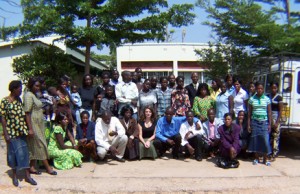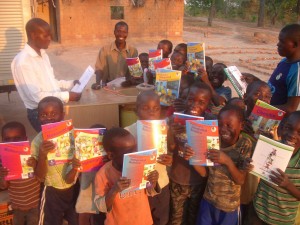When Amanda Lalley ’07 arrived in Solwezi, Zambia, as a Peace Corps volunteer almost three years ago, she learned KiKaonde, a language spoken only in the northwest region of the country.
“KiKaonde is a minority language, even in Zambia,” says Lalley. “It is spoken in about three districts. I would estimate that fewer than 300,000 people speak it.” She explained that she received some pre-service intensive language training, but that she didn’t really learn it until living with the people. “You learn the language as you go.”
Lalley, a technical assistant for education, is living in Lusaka, the capital. She works with Camfed (Campaign for Female Education) Zambia on a project to support community schools that is funded by the European Commission.

Amanda Lalley '07 (center) at training for teacher mentors in Lusaka, Zambia.
“Community schools are those that are not supported fully by the government,” she explains. “They were started as a community initiative. We provide training to teachers, administrators, and parent-teacher committees. There is also provision for providing teaching and learning materials and strengthening district education structures to support these schools.”
Camfed provides educational support for girls from grade one through a higher level, such as technical school, training college, or a university. Once the girls complete school, they become members of the Camfed Association where they learn skills such as entrepreneurship and financial management.
Zambia is a rural country with a landscape that is mainly high plateau with some hills and river valleys. Most places, outside of district or provincial capitals, do not have electricity or running water, explains Lalley. In Lusaka, Lalley takes the bus and walks to her office each day.
“You see many people cycling and walking all over town,” she says. “There are a number of people selling vegetables, peanuts, bananas, cassava, and other produce on the side of the road. I suppose it’s more of a small-town atmosphere, but after living in a village for two years, it seems like an urban setting to me.”
From April 2008 to April 2010, Lalley lived in Solwezi. She worked at the basic school level (grades 1-7) helping implement Ministry of Education programs and leading school-level, teacher-training programs. She interacted with teachers and officers at the local, district, and provincial levels. “I also worked with an agricultural group in the community and did HIV/AIDS work with the school nearest to my home,” she adds.
Lalley received an A.B. with a double major in international affairs and Africana studies. As a member of the track and field and cross country teams, she won the James F. Bryant ’40 Excellence Award in 2006 and was president of the Student-Athlete Advisory Committee and academic chair of Delta Delta Delta sorority.
She first became interested in Africa at age 13 when she made a trip with her family to Botswana, Zimbabwe, and Zambia to visit her sister, who was working for a safari company in Botswana. “Ever since, I have been obsessed with the region and desired to learn as much as I could about its cultures, politics, and wildlife.” In summer 2005, she studied at the University of KwaZulu Natal in South Africa.
Before joining the Peace Corps, Lalley worked for about three months with the Boys and Girls Club in Syracuse, N.Y., near her hometown.

Amanda Lalley ’07 and others in her group distributed new books to students at a rural community school near Lusaka, Zambia.
Lalley’s group recently distributed books to community schools in the rural areas.
“Seeing the faces of joy reminded me why I am sitting in this office,” says Lalley. “When you are living in town, it’s easy to forget what it’s like in the village, even if you lived there for two years.”

